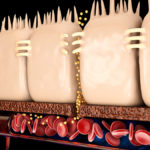By David Blyweiss, M.D., Advanced Natural Wellness
November 16, 2015
In This Issue:
- Antibiotic resistant bacteria gains ground in hospitals
- Half of hospital deaths linked to sepsis
- Quick tips to build immunity
These days, coming out of the hospital healthier than you went in is a crap shoot. That’s because these facilities are breeding grounds for antibiotic resistant bacteria.
Now, MRSA is probably the first thing that pops into your mind. That’s because it’s in the news a lot. What you don’t hear, however, is that almost all invasive MRSA infections are associated with health care. In fact, more than a million patients are infected each year.
You can also pick up a deadly form of diarrhea when you’re in the hospital. It’s called c. difficile. And it’s incredibly difficult to treat. That’s because antibiotics are largely to blame for this nasty infection. (Ironically, the standard treatment for c. difficile is another antibiotic.)
MD Exposes the Hidden Danger to Your Eyes

When your eyesight starts to fail, it's a real problem. Suddenly you can't go to the grocery store... you can't get to the doctor if you have an emergency... you can't meet your friends for dinner…
Your "regular" doctor doesn't have time to keep up with the latest research. And the same goes for eye doctors. They go to school to learn how to fit you for glasses and contacts, but have no way of preventing the damage and loss of eyesight that threatens your freedom and independence.
Let me show you something that explains a LOT about how your eyes work.
In my FREE Special Report, I'll show you a HUGE, untapped resource for your eyes that safely and naturally restores clear, effortless eyesight.
Click here to get started...
But there’s an even greater threat that you may not be aware of. And it’s associated with up to half of all hospital deaths here in the U.S.
I’m talking about sepsis, or what you might know as “blood poisoning.”
Sepsis triggers a cascade of events that cause rapid damage to your organs. It can even cause them to fail. And aging adults – like us Baby Boomers – are about three times more likely to develop it in the first few months after a hospital discharge.
However, if you had any type of infection while at the hospital, the risk is 30 percent higher.
But there’s a surprising twist that comes with this news.
It turns out that antibiotic use during hospitalization may contribute to sepsis. That’s because these drugs don’t just kill off bad bacteria. They also kill off the good bacteria. And this seriously disturbs the “heart” of your immune system: Your gut microbiome.
You see, somewhere around three-quarters of your immune system is found in your gut. And when there’s an imbalance of good and bad gut bacteria, it leaves you susceptible to invading bacteria.
This opens the doors to MRSA infection, c. difficile and sepsis. (By the way, if not properly treated, both MRSA and c. diff. can lead to sepsis, too.)
The World's Quickest Solution for Ending Prostate and Urinary Misery
This has recently been revealed to be one of the only real breakthroughs in prostate health.
The seeds of a strange fruit (sometimes called "Chinese Apples") hold powerful phytonutrients that are a revolution in prostate health.
In fact, UCLA and Veterans Administration research have now proved this to be true.
Not only that, but it may be the worlds quickest solution for ending prostate misery.
Simply stated, these phytonutrients represent a huge step beyond beta sitosterol, saw palmetto, and other phytosterols alone.
Simply click HERE if you want to have fast prostate relief...restful, uninterrupted sleep...no more constant "urges to go"...enhanced virility...and optimal prostate support for life.
With this in mind, it goes without saying that you should never take an antibiotic unless absolutely necessary. And on those occasions when you really need one, ask your doctor for an older, narrow-spectrum antibiotic that targets your specific problem.
You can also boost your immune response by feeding your gut.
The most effective way to do this is to start taking a daily probiotic. If you know you’re going into the hospital or prescribed an antibiotic, double your dose. (When it comes to probiotics, more is always better. In fact, it’s not uncommon to take five to twenty billion organisms per day in divided doses.)
Look for one that contains multiple strains of lactobacillus andbifobacterium. It should include a “prebiotic” to help the good bacteria thrive. And check to see how many colony forming units (CFUs) are guaranteed at expiration, not at the manufacture date.
Better yet, take good care of your body so you can avoid going to the hospital altogether.
You can do this by adopting the Mediterranean way of eating. It’s not only the healthiest diet in the world. It also promotes a healthy diversity of gut microbiota.
Choose organic fruits and veggies. Limit meat consumption to about 13% of your diet. Buy grass-fed lamb and beef, pastured poultry and wild caught fish that haven’t been pumped with antibiotics.
Staying active is another way to cut your chances of hospitalization. At somewhere around the age of 50, we all start to lose muscle mass and reaction speed. If you don’t do anything about it you’ll end up weak, fragile and ill.
My personal recommendation is to opt for high-intensity interval training or HIIT.
This type of training involves a burst of short-term high intensity exercise followed by a recovery period. For example, after warming up for a few minutes, do a 30-second sprint – walking or running as fast as you can – followed by 3 or 4 minutes of easy walking. Repeat 4 to 6 times. The workout ends with a 3 to 4 minute cool-down.
You’ll not only build strength. Vigorous exercise is also associated with an increase in microbiota diversity.
These are important measures to consider, because you never know when you’re going to end up in the hospital. And a healthy gut – and healthy body – give you a much better chance of coming home safe and sound.
Sources:
Klevens RM, et al. Invasive methicillin-resistant Staphylococcus aureus infections in the United States. JAMA. 2007 Oct 17;298(15):1763-71.
Liu V, et al. Hospital deaths in patients with sepsis from 2 independent cohorts. JAMA. 2014 Jul 2;312(1):90-2.
Prescott HC, et al. Hospitalization Type and Subsequent Severe Sepsis.Am J Respir Crit Care Med. 2015 Sep 1;192(5):581-8.
De Filippis F, et al. High-level adherence to a Mediterranean diet beneficially impacts the gut microbiota and associated metabolome. Gut. Published Online First 28 September 2015
Clarke SF, et al. Exercise and associated dietary extremes impact on gut microbial diversity. Gut. 2014 Dec;63(12):1913-20.






